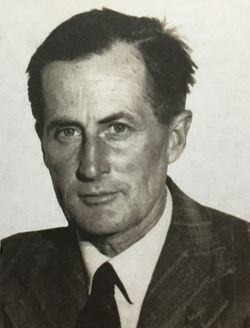
Council of Heads of Australasian Herbaria
Australian National Herbarium
Biographical Notes
 |
Council of Heads of Australasian Herbaria |
 Thomson, Donald Finlay Fergusson (1901 - 1970)
Thomson, Donald Finlay Fergusson (1901 - 1970)Born at Montclair Ave, Brighton (Melbourne), Vic, on 26 June 1901; died at 'Worlingworth', Eltham (Melbourne), Vic, on 12 May 1970.
(Thomson's ashes were scattered by plane over Caledon Bay, north eastern Arnhem Land, NT.)
Donald began school at Rosbercon College, Vic, in
1906 and left at the age of 12, afterwards attending
the Burnley School of Horticulture in Burnley
Richmond (Melbourne) in 1915 for a year. He
moved to Scotch College, from which he graduated
in 1920, going on to study natural science at The
University of Melbourne (BSc) and graduating in
1925.
In 1926, he accepted a cadetship as a journalist with The Herald (Melbourne). He
undertook a one-year diploma course in anthropology at The University of Sydney (Dip.
Anthrop.) between 1927-1928 and ultimately recelved his DSc from the University of
Melbourne in 1934.
His career path broadened with the award in 1938 of a Rockefeller
Traveling Fellowship at Christ's College, University of Cambridge (England). He continued
studying and received a Doctorate of Philosophy (PhD) in Anthropology from the University of
Cambridge in 1950.
Donald worked as a biologist at the Walter and Elza Hall Institute of Medical Research (1929-
1930) in Melbourne, and held the following posiions at the University of Melbourne: Research
Fellow 1932 to 1938 and 1945 to 1953, Associate Professor 1953 to 1964 and Professor of
Anthropology in 1964 to 1968.
He served in WW2 (1939-1944) as a Wing Commander in the RAAF and
was wounded in action in Dutch New Guinea when attacked by indigenous tribesmen, for which he
was awarded an OBE in 1945.
Among his more notable contributions to the war effort was his
local knowledge of the Arnhem Land, NT, coastline, which proved to be an invaluable asset
during the impending Japanese invasion in 1942. He organised the indigenous people into a
special reconnaissance unit, and also took part in two patrols through uncharted forests of the
Obaa-Wildemann Rivers in Dutch New Guinea during 1943. He was discharged from service
on medical grounds on 13 October 1944.
Donald's interests in anthropology blossomed after acquiring a grant of 600 pounds in 1928 to work
among the indigenous families living on Cape York Peninsula. The grant funded three
expeditions to the region in 1928, 1929 and 1932-1933 two to Arnhem Land in 1935 and
1936-1937, and another three to the Great Sandy and Gibson Deserts, WA in 1957,
1963 and 1965.
He went on to become the foremost authority on the indigenous trbes of
north eastern Arnhem Land, for which he is ackngwledged internationaly. He
endeavoured to gain recognition of the land and other rights for the indigenous inhabitants of
Arnhem Land, and set up the Australian Institute of Aboriginal Studies (AIAS) in 1961.
His work has been recognised in popular circles through the Rolf
de Heer film 'Ten Canoes'. which features his special talents as a photographer as part of its storyline.
After his death in 1970, Donald's extensive and detailed photographic, anthropological,
zoological and botanical collections were donated by his wife Dorita Maria Thomson (née
McColl) to The University of Melbourne.
(Only 8 herbarium specimens collected by Thomson, D.F. show up in Australasian Virtual Herbarium, AVH, in 2022)
Source: Extracted from book: 'Passions in Ornithology: A century of Australian Egg Collectors' (2020), Mason & Pfitzner, Canberra. [consult for source references]
Portrait Photo: courtesy of Dorita M. Thomson, extracted from the above book.